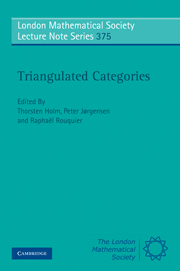Book contents
- Frontmatter
- Contents
- Preface
- Triangulated categories: definitions, properties, and examples
- Cohomology over complete intersections via exterior algebras
- Cluster algebras, quiver representations and triangulated categories
- Localization theory for triangulated categories
- Homological algebra in bivariant K-theory and other triangulated categories. I
- Derived categories and Grothendieck duality
- Derived categories and algebraic geometry
- Triangulated categories for the analysts
- Algebraic versus topological triangulated categories
- Derived categories of coherent sheaves on algebraic varieties
- Rigid dualizing complexes via differential graded algebras (survey)
Homological algebra in bivariant K-theory and other triangulated categories. I
Published online by Cambridge University Press: 07 September 2011
- Frontmatter
- Contents
- Preface
- Triangulated categories: definitions, properties, and examples
- Cohomology over complete intersections via exterior algebras
- Cluster algebras, quiver representations and triangulated categories
- Localization theory for triangulated categories
- Homological algebra in bivariant K-theory and other triangulated categories. I
- Derived categories and Grothendieck duality
- Derived categories and algebraic geometry
- Triangulated categories for the analysts
- Algebraic versus topological triangulated categories
- Derived categories of coherent sheaves on algebraic varieties
- Rigid dualizing complexes via differential graded algebras (survey)
Summary
Abstract. Bivariant (equivariant) K-theory is the standard setting for non-commutative topology. We may carry over various techniques from homotopy theory and homological algebra to this setting. Here we do this for some basic notions from homological algebra: phantom maps, exact chain complexes, projective resolutions, and derived functors. We introduce these notions and apply them to examples from bivariant K-theory.
An important observation of Beligiannis is that we can approximate our category by an Abelian category in a canonical way, such that our homological concepts reduce to the corresponding ones in this Abelian category. We compute this Abelian approximation in several interesting examples, where it turns out to be very concrete and tractable.
The derived functors comprise the second page of a spectral sequence that, in favourable cases, converges towards Kasparov groups and other interesting objects. This mechanism is the common basis for many different spectral sequences. Here we only discuss the very simple 1-dimensional case, where the spectral sequences reduce to short exact sequences.
Introduction
It is well-known that many basic constructions from homotopy theory extend to categories of C*-algebras. As we argued in [17], the framework of triangulated categories is ideal for this purpose. The notion of triangulated category was introduced by Jean-Louis Verdier to formalise the properties of the derived category of an Abelian category. Stable homotopy theory provides further classical examples of triangulated categories. The triangulated category structure encodes basic information about manipulations with long exact sequences and (total) derived functors.
- Type
- Chapter
- Information
- Triangulated Categories , pp. 236 - 289Publisher: Cambridge University PressPrint publication year: 2010
- 14
- Cited by



